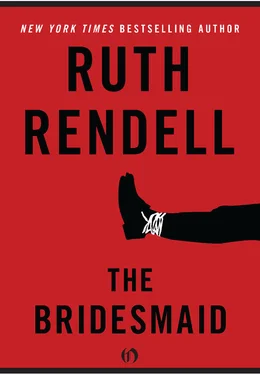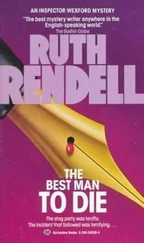Ruth Rendell - The Bridesmaid
Здесь есть возможность читать онлайн «Ruth Rendell - The Bridesmaid» весь текст электронной книги совершенно бесплатно (целиком полную версию без сокращений). В некоторых случаях можно слушать аудио, скачать через торрент в формате fb2 и присутствует краткое содержание. Год выпуска: 2010, Издательство: Open Road Integrated Media LLC, Жанр: Триллер, на английском языке. Описание произведения, (предисловие) а так же отзывы посетителей доступны на портале библиотеки ЛибКат.
- Название:The Bridesmaid
- Автор:
- Издательство:Open Road Integrated Media LLC
- Жанр:
- Год:2010
- ISBN:нет данных
- Рейтинг книги:3 / 5. Голосов: 1
-
Избранное:Добавить в избранное
- Отзывы:
-
Ваша оценка:
- 60
- 1
- 2
- 3
- 4
- 5
The Bridesmaid: краткое содержание, описание и аннотация
Предлагаем к чтению аннотацию, описание, краткое содержание или предисловие (зависит от того, что написал сам автор книги «The Bridesmaid»). Если вы не нашли необходимую информацию о книге — напишите в комментариях, мы постараемся отыскать её.
The Bridesmaid — читать онлайн бесплатно полную книгу (весь текст) целиком
Ниже представлен текст книги, разбитый по страницам. Система сохранения места последней прочитанной страницы, позволяет с удобством читать онлайн бесплатно книгу «The Bridesmaid», без необходимости каждый раз заново искать на чём Вы остановились. Поставьте закладку, и сможете в любой момент перейти на страницу, на которой закончили чтение.
Интервал:
Закладка:
“I won’t touch them,” Philip said, making for the stairs.
“You won’t get the chance.”
She had removed the binoculars. Philip felt quite shaken by this encounter. Like most people, he was frightened by madness even when manifested in its milder forms. Did she perhaps suspect her husband of using the glasses to watch women undressing or something like that? And if so, what good did having her suspicions repeatedly proved sound do her? At least temptation had been removed from him. He wouldn’t be able to take a close look at Flora without them.
The guesses he had made at the measurements were so nearly accurate as to confirm his opinion that he was wasting his time coming here. But denied the use of the binoculars, he perversely found himself longing to look at Flora again. He opened the window and leaned out. The may tree had bloomed and shed most of its blossoms. The grass and paving stones were pink with fallen petals, the purple rock garden sprinkled with pink as if covered by a rosy veil. Petals lay on Flora’s shoulders and on her outstretched arm, and the flowers she carried were no longer stone but a bouquet of may.
But she seemed very far away from him. The distance rendered her features and the details of sculpture invisible. He retreated, closing the window, wondering as he did so if Mrs. Ripple had placed a hair across the catch. Perhaps she would come up after he had gone and sprinkle the window frame with fingerprint powder. Then, woe betide him when he came to inspect the work in progress, as he might easily have to do.
She was waiting for him at the foot of the stairs. She said nothing, and her silence and long, cold, basilisk stare had the effect of making him speak in a nervous, hearty way.
“Well, thank you very much, Mrs. Ripple, that’s done. You’ll be hearing from us in due course. We’ll keep you up to date with progress.”
He passed her, left her behind his line of vision, felt her eyes following him. Halfway down the path he saw Arnham’s car go by. Not the Jaguar but a second car; he would have a second car. The Jaguar probably belonged to his company the way the Kadett belonged to Roseberry Lawn. The woman in the passenger seat, the side which was nearest to him, was the woman he had seen at the window. It was a warm day and the car window was open on her side. Her arm rested along the rim of the glass panel. On the hand was the diamond ring and on the wrist a diamond watch. Arnham he could see only as a dark heavy silhouette.
The direction they were going in was away from their house. It was this which made up Philip’s mind for him—if his mind could be said to be made up, if his mind entered into it. The Kadett even seemed to drive itself. Caution and reason returned sufficiently to make him park it a little way down the road.
There was no one about. There never was, in suburbs in the afternoons. Philip could remember his father telling him of the time when he was a child and there had been people about in streets like this one, quite a lot of them, people on foot because cars were few. These houses might have been uninhabited, their garages closed, their front gardens empty. All down the road, the green of foliage and grass, the whiteness of buildings, were patched with laburnums in full bloom, a pure glistening yellow. The sun shone onto stillness and silence.
Philip went into Arnham’s garden by the gates to the garage drive and made his way to the wooden door that evidently led to a passageway between garage and house. If it was locked, that would be the end of the enterprise, but it wasn’t locked. Once inside, in a narrow defile with brick walls on either side, he realised he had brought neither container nor covering with him. And he knew that if he went back to the car to find something suitable, he would never return, he would give up and drive away.
At the end of the passage was a yard or terrace of concrete slabs. A very commonplace coal bunker on one side, a pair of dustbins on the other. Arnham had changed the Buckhurst Hill house for something distinctly inferior. Of course, he had had to divide the sale price with his former wife. Protruding over the rim of one of the dustbins was a blue plastic bag, provided no doubt by the local authority’s refuse collection service. Philip helped himself to that bag.
He crossed the lawn to where she was. Close to, the fallen may blossoms on her shoulders and the crown of her head gave her a neglected look. He brushed them off, lightly blew away a petal from her ear, the same ear that once, long ago, he had chipped with a stone from his catapult. Squatting down close in front of her, he observed, as he had never quite done before, the remoteness of her gaze, the way her eyes seem to stare past those who looked at her, to fix themselves on some distant and perhaps glorious horizon. Of course she was a goddess; she was above earthly things and human needs.
His thoughts surprised him. They were as fanciful as if he were dreaming or in a fever. This was the way he had thought and imagined things while in the throes of that bad bout of flu he had had in the winter. But why on earth had Arnham told Christine that Flora looked like her? Or had that perhaps been wishful thinking on her part? She looked like no real woman Philip had ever seen, though he thought quite suddenly—and rather madly—that if he ever saw a real woman with that face, he would at once fall in love with her.
He reached for Flora and lifted her up. Some of the pink petals fell off the bunch of marble flowers. She seemed even heavier than when he had carried her up the hill from Buckhurst Hill station. He drew the blue plastic bag over her head, laid her on the grass and tied a knot in the top of the bag. Carrying the bundle in his arms, he might have been holding a length of piping or some garden tool.
It was when he was halfway across the grass towards the passageway and the wooden door that he saw he was watched. A man in a window next door was watching him. Philip told himself he was doing nothing wrong. Flora didn’t belong to Gerard Arnham. Or rather, he thought somewhat obscurely, she might have if Arnham had done the right thing by Christine, loved her and married her; but in the present circumstances, Flora certainly didn’t belong to him. Arnham, by his behaviour, had forfeited the right to own her. Philip had read somewhere that if you borrow an object and hold on to it, the only person who has a right to take it from you is the true owner. That was the law. Well, he was the true owner. Flora had been lent to Arnham. She was his conditionally only on his marrying Christine—that surely was an understood thing. Nevertheless, he quickened his pace. In spite of the weight of her, he ran down the path to the garage gates.
His arms full, it took him a moment or two to get them open. A voice behind him, from the other side of the fence, said, “I say, excuse me, what exactly do you think you’re doing with that?”
The words were very similar to Mrs. Ripple’s. Philip didn’t even turn his head to take a look at the enquirer. He ran. Gasping because Flora was so heavy, he ran down the street to where his car was parked. He heaved her into the backseat and struggled into his safety belt. The man hadn’t followed him. Philip was certain he had done the more sensible thing and gone back into the house to phone the police.
He saw his job lost, a conviction recorded against him for a criminal offence. But be reasonable, keep your head, the man hadn’t seen his car, hadn’t taken a note of the number. Philip’s hands shook on the wheel but he steadied them—he made a mammoth effort and steadied them. He began to drive, took the left-hand turn, then a right. There was no one behind him and no one ahead. Out on the big road, heading for Barkingside, he heard the siren of a police car. But why assume it was for him, that it had anything to do with him? A police car with a howling siren wouldn’t turn out because a man had been seen coming out of a garden with something in a plastic bag. They would be more likely to send an officer round on a bike.
Читать дальшеИнтервал:
Закладка:
Похожие книги на «The Bridesmaid»
Представляем Вашему вниманию похожие книги на «The Bridesmaid» списком для выбора. Мы отобрали схожую по названию и смыслу литературу в надежде предоставить читателям больше вариантов отыскать новые, интересные, ещё непрочитанные произведения.
Обсуждение, отзывы о книге «The Bridesmaid» и просто собственные мнения читателей. Оставьте ваши комментарии, напишите, что Вы думаете о произведении, его смысле или главных героях. Укажите что конкретно понравилось, а что нет, и почему Вы так считаете.











